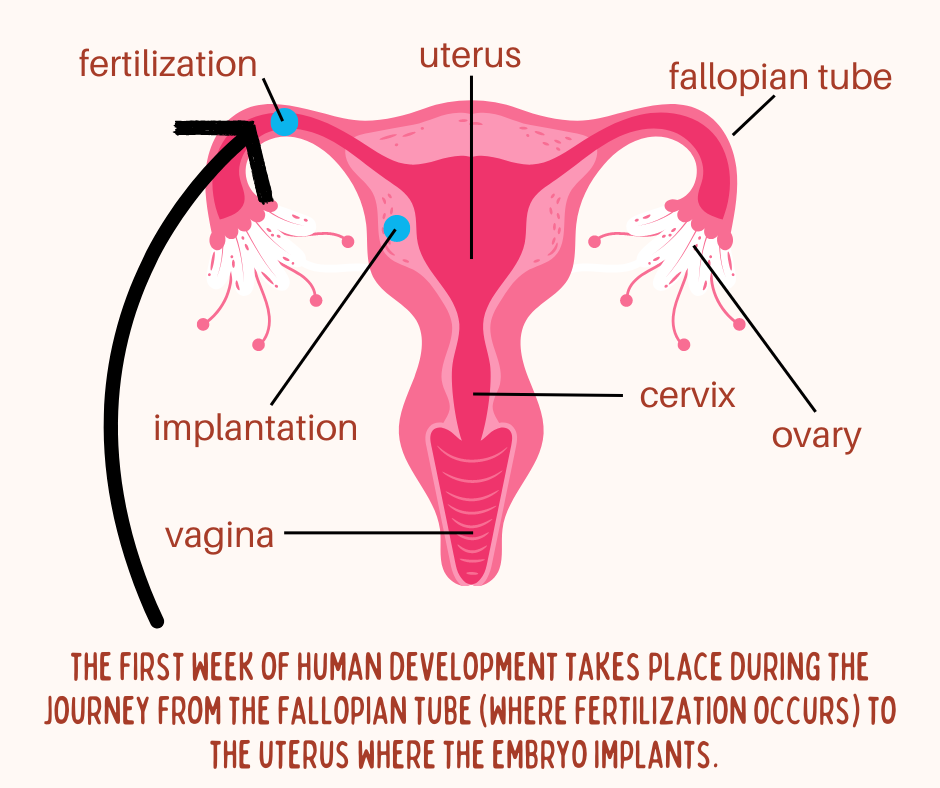When we think of getting a pregnancy ultrasound, it seems like it would be something you do only when you want to be pregnant. Often, most of the images we see of ultrasounds are in baby announcements on Instagram or Facebook. Ultrasounds are for gender reveals, or for happy couples on their baby planning journey. And it’s true: ultrasounds can be a special way to connect with the baby before the little one is born. But not every pregnancy is a happy result of meticulous family planning. Oftentimes pregnancies are a big surprise, and they don’t always end with a decision to parent.
When it comes to an unplanned pregnancy, you may ask, “What’s the point of getting an ultrasound?” This question comes up especially when you’re unsure of your pregnancy decision. An unplanned pregnancy can feel like a problem to be solved, a consequence of failed birth control. Maybe you feel that your only solution is abortion, and you just want to take the pill and get it over with. You may feel that whether or not you need an ultrasound depends on whether or not you’re keeping the pregnancy.
However, there are many reasons to get an ultrasound regardless of where your pregnancy journey takes you. Whether your pregnancy ends in abortion, miscarriage, or childbirth, there are always good reasons to get an ultrasound early on. Ultrasounds are an important part of your reproductive health care.
This article will discuss the following reasons you should have an ultrasound when you find out you are pregnant, regardless of your pregnancy decision. An early ultrasound will:
- Help you determine the status of your pregnancy
- Help you determine when you got pregnant
- Help you determine the location of your pregnancy
- Protect your health and provide you peace of mind
Are you ready? Let’s get into it!
The Status of Your Pregnancy
The first thing an ultrasound can help you do is identify the status of your pregnancy. What do we mean by pregnancy status? Well, there is a general sequence that a healthy pregnancy follows in terms of growth and development.
It goes like this:
- During week one and two of your pregnancy, you may not have technically been pregnant. We’ll explain this in more detail in the section on gestational age, but here is a quick explanation. Pregnancy dates are calculated from the first day of your last menstrual period, so the week of your period and the next week prior to ovulation are included in the dates counted toward your pregnancy, even though you were not yet pregnant. It’s a little confusing, I know, so for now let’s skip to week three.
- During week three, fertilization occurs–meaning, this is when you most likely actually got pregnant. The sperm and the egg meet in one of your fallopian tubes. When they unite, the fertilized egg is called a zygote. The zygote begins its journey down the fallopian tube toward the uterus, the body’s designated location for the pregnancy to develop and grow. During week four, the pregnancy begins to implant into the uterine lining.
- During week five, your body’s level of the hCG hormone begins rapidly increasing. As hCG levels increase it signals your body to stop the release of eggs from the ovaries and instead produce more estrogen and progesterone to nourish your growing pregnancy. From this point on, every week leads to the development of new parts of your growing baby’s body (1).
This is a healthy start to a developing pregnancy. Ideally, your pregnancy is progressing along this path.
Unfortunately, this isn’t always the case. Issues come up that disrupt the predicted development of a healthy pregnancy. One common example is miscarriage. Miscarriage, also known as spontaneous abortion, is the spontaneous loss of a pregnancy before 20 weeks gestation. Estimates show that as many as 26% of all pregnancies end in miscarriage, and up to 10% of clinically recognized pregnancies (2). (That means, sometimes people lose pregnancies without ever knowing they were pregnant in the first place.)
Although miscarriage is quite common, that doesn’t make it easy. Many women who go through miscarriage experiences feelings of shame, guilt, or failure, among other emotions. The loss of miscarriage can feel isolating for those lacking support and community. If you are struggling with pain resulting from a previous pregnancy loss, Micarriage Hurts: Hope After Loss is one resource offering healing resources and a place to share your story anonymously among other people’s stories. You are not alone.
What can an ultrasound do for you?
Getting an ultrasound allows you to identify if you are miscarrying or experiencing some other early pregnancy complication (such as a molar pregnancy). Maybe you are considering getting an abortion. If you are, it’s still important to get an ultrasound first. Confirming the status of your pregnancy allows you to determine if your pregnancy is viable at all before you go through the process of terminating it.

When Did I Get Pregnant?
As mentioned before, during week one and two of pregnancy, you weren’t actually pregnant. (Confusing, we know. But stay with us.)
Gestational age is the common term used during pregnancy to describe how far along the pregnancy is. It is measured in weeks, from the first day of the woman’s last menstrual cycle to the current date.
Conception usually happens two weeks after the start of your last period. When your OB/GYN or medical provider is calculating your due date, they’re going to count ahead 40 weeks from whenever your last period began. So, those days of your last period are counted into your pregnancy’s gestational age, even though there technically was no pregnancy at the time (3).
Finding out the exact day you got pregnant is complicated, since sperm can survive up to 5 days inside the female body. On top of that, dates of ovulation vary from person to person (4). All that medical providers can give you are close estimates, unless you had only one sexual encounter during the given timeframe. Even so, there’s no guarantee that the day of that encounter was the same day the egg was fertilized.
What can an ultrasound do for you?
Limited dating ultrasounds are used to determine the gestational age of the pregnancy. If you are someone who experiences irregular periods, you may have trouble identifying when you got pregnant based on the symptom of a missed period alone. An ultrasound can help you determine as accurately as possible when you got pregnant.
If you are considering abortion, gestational age is a key piece of information in the process of determining what types of abortion are available to you. Medical abortion (the abortion pill) is FDA approved up to 10 weeks gestation. If you find out about an unplanned pregnancy later than 10 weeks gestation, then only surgical abortion options are available to you. For your own safety, it is important not to take the abortion pill without first determining the gestational age of your pregnancy.

Gestational age is calculated from the first day of your last period.
The Location of Your Pregnancy
Pregnancies are supposed to develop and grow inside the uterus. The uterus is your body’s safe place to nurture, feed, and protect a growing baby. However, there is a condition known as ectopic pregnancy when your pregnancy implants somewhere outside the uterus. Most often, ectopic pregnancies implant in the fallopian tubes (this is called a tubal pregnancy). An ectopic pregnancy cannot survive. Furthermore, an ectopic pregnancy can also be extremely dangerous to the pregnant woman.
Ectopic pregnancies can start out feeling like normal pregnancies. Early warning signs of ectopic pregnancy include light vaginal bleeding, pelvic pain, shoulder pain, or an urge to have a bowel movement. Emergency signs of a possible rupture include extreme lightheadedness, fainting, and shock. Seek immediate emergency medical assistance if you have symptoms of an ectopic pregnancy.
What can an ultrasound do for you?
Symptoms alone may not be enough to help you identify an ectopic pregnancy (5). An ultrasound is one way to help identify ectopic pregnancy, although it’s not foolproof. “Ectopic pregnancy is a diagnosis that is quite challenging to make. It has been estimated that 40% of ectopic pregnancies go undiagnosed on initial presentation” (6).
Although an ectopic pregnancy is difficult to spot, if a pregnancy can be identified inside the uterus, this greatly reduces the risk of an ectopic pregnancy. Still, it is important to do both. Know the symptoms, and get an ultrasound. Listen to your body and seek care if needed.
Unplanned Pregnancy: Protecting Your Reproductive Health & Your Peace of Mind
An ultrasound can help you identify the status, location, and gestational age of your pregnancy. All good information to have. When it comes to making lasting decisions about your reproductive health (such as whether or not to have an abortion, or what type of abortion to have), it is best to do so in light of good information.
Good medical information protects you physically, but it also serves to protect your peace of mind. Knowing what’s going on with your body, understanding various symptoms, having the input of a professional clinician–all these can calm your spirit as you move forward with your pregnancy. Think of protecting your peace of mind as a form of prenatal care.
You are a whole person. We care about you physically, emotionally, mentally, and spiritually. Your body and your mind are connected. Caring for your body is a way of caring for your mind. Having an ultrasound exam by a trained professional is a way to get good information and understand your pregnancy better, no matter what pregnancy decision lies ahead of you.
If you are experiencing an unplanned pregnancy, Clearway Clinic is here for you. Schedule an appointment today for a free pregnancy test, limited dating ultrasound, and options information. Call our office at 508-438-0144 to learn more.
- See https://www.mayoclinic.org/healthy-lifestyle/pregnancy-week-by-week/in-depth/prenatal-care/art-20045302 for a more detailed understanding of fetal development during the first trimester.
- See https://www.ncbi.nlm.nih.gov/books/NBK532992/ for more info.
- Explanation taken from https://www.mayoclinic.org/healthy-lifestyle/pregnancy-week-by-week/in-depth/prenatal-care/art-20045302.
- See https://assureomaha.com/is-it-possible-to-find-out-the-exact-day-you-got-pregnant/#:~:text=Knowing%20the%20exact%20day%20of,day%20of%20their%20last%20period. for more info.
- See https://www.nhs.uk/conditions/ectopic-pregnancy/diagnosis/#:~:text=An%20ectopic%20pregnancy%20is%20usually,t%20need%20a%20local%20anaesthetic. for more info.
- See https://www.ncbi.nlm.nih.gov/books/NBK482192/ for more info.
Reviewed by Clearway Staff. This blog is not intended to replace the advice of a medical professional.




